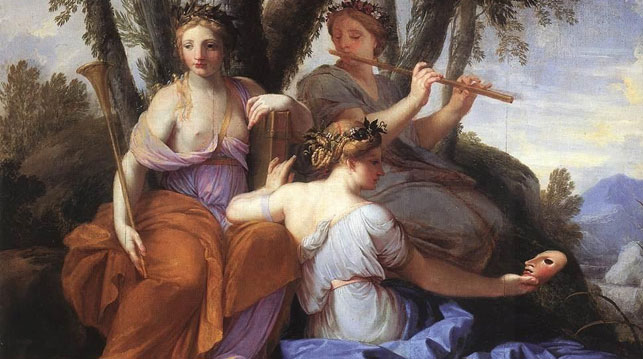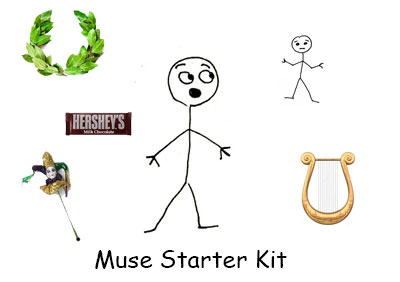
It can seem quaint now, even primitive, to talk seriously about the Muses, those nine goddesses who inspire artists, particularly writers and musicians, as anything other than characters in Greco-Roman mythology.
Yet, if you hang out with artists for even a little while, you’ll probably hear them complaining that their “muse is being uncooperative” or that they need to “feed the muse.” It may sound ironic, but the modern artist (especially the writer!) dismisses the muse at their own peril.
What Is a Muse, Really?
All the gods and goddesses have both different personalities and different relationships with people. Muses are sources of inspiration. They do not control, and they do not personally create (regardless of how much writers wish they did).
Sometimes, a muse (not capitalized) can be a person whose beauty or goodness inspires others to create (e.g., Benedict Cumberbatch, Mother Teresa). Sometimes a muse is a cause, an ideal, or a mentor. A muse can be a bit of music, a Wonder of the World, or a rainstorm.
Most important, however, is not the form of the muse but the idea that the muse is outside the artist. Muses are about the world’s data input, not the artist’s interior process.
Get a free sample proofread and edit for your writing.
Two professional proofreaders will proofread and edit your writing.
The Classic Muse: Details Are Clues
Before we jump to the idea that today’s muses are simply personifications of inspirational context, however, let’s examine those classic goddesses. They’ve been popular for thousands of years, after all.
First, of course, they’re women. Professional artists have been almost all male until just recently, so there’s that. The Muses are Other.
And being women, muses are granted all the Other-ness men like to ascribe to women: being fickle, inconsistent, obedient when they’re good and unfaithful when they’re bad, and ultimately idle. They do nothing for themselves. They inspire.
They are also specialized, with Erato for love poetry (hence the word “erotic”), Terpsichore for dancing, and the rest. Thus, these Muses don’t generally inspire art; they inspire specific art in specific ways, adapting themselves (or being adapted) to the different demands of the artists. The musical Muses have harps, the writing Muses have scrolls, and so on.
And finally, being goddesses, they are quite independent and seriously demanding.
Today’s Muse
Today, seeing as artists come in all manner of genders, and not many of us are Greco-Roman pagans, we can replace “female” with “Other” and “goddess” with “free agent” and see the Muse as very much alive and well in an artist’s life.
The uninspired artist is also the not-making-money artist, and those who seek inspiration can easily (even inevitably) feel they are chasing after a capricious, demanding, free-agent Other who won’t cooperate.
Why the Muse Idea Helps
Rather than fighting against that feeling, why not embrace it? If we recognize that the Muse is an image of our Other-selves, we better understand that Muse and gain more insight into our own creativity.
But, you may ask, why bother with the role-playing? Why not just ask, “What inspires me?”
To this, I (and many others in publishing today) respond, “Doesn’t being an artist make you self-conscious enough already?”

The highs and lows of artistic expression and non-expression (e.g., writer’s block) are tough on the psyche. Personifying your inspirational sources can ease the burden and loneliness of sitting at your computer (or whatever) and trying to make something intensely personal that will also please others.
Muse building can take all manner of approaches, and your Muse will herself/himself/itself be unique. I’m not talking about having an imaginary friend (inspiration is fickle and demanding, after all), but neither am I suggesting you pray to a goddess in robes and a laurel wreath.
Care for Your Muse
Once your Muse has a personality, you can establish ways to care for and feed your Muse. Does your Muse like to curl up with a hot cup of tea and listen to piano music? Or does your Muse prefer a crowded bar and country tunes on the jukebox? Or does he/she/it want silence?
Once you care for your Muse, he/she/it will be kind to you, so you’ll be kinder to yourself and all the more respective to inspiration when it comes.
Julia H.
Get a free sample proofread and edit for your writing.
Two professional proofreaders will proofread and edit your writing.
Get a free sample proofread and edit for your document.
Two professional proofreaders will proofread and edit your document.
We will get your free sample back in three to six hours!